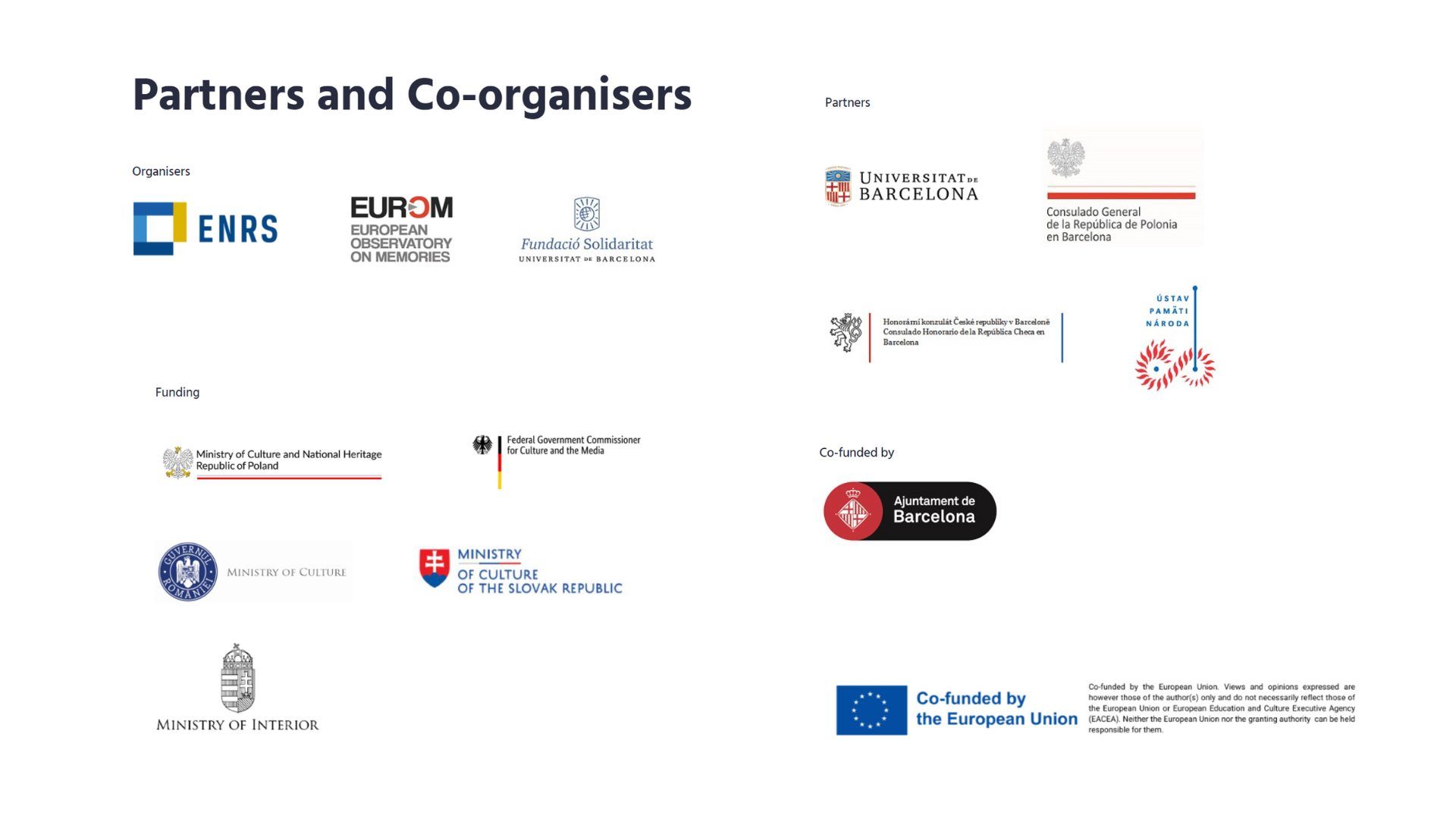This joint event organized by the European Network Remembrance and Solidarity (ENRS) and the European Observatory on Memories (EUROM) aims to promote and deepen cooperation between institutions and organizations involved in researching Europe’s 20th-century history. Over three days, an international group of academics and practitioners from different countries will discuss the importance and role of resistance and solidarity in the context of past and contemporary conflicts. The event is driven by the conviction that dialogue concerning the history of the last century is needed, taking into account various sensitivities, experiences and existing interpretations.
Videos
All sessions of the conference have been recorded, both with English and Spanish interpretations.
Programme (online version)
Registration
Speakers
Background
The history of dictatorships and authoritarian regimes in the 20th century can also be understood as a history of resistance and nonconformity. In (post)totalitarian and authoritarian regimes, there have always been those who have not been indifferent to the imposition of restrictions on their own or others’ individual freedoms – freedom of expression, religion, political beliefs, etc. – and to social injustices and inequities, and who have chosen some form of resistance rather than merely being bystanders, indifferent or collaborating. A growing body of research in recent years has drawn attention to the various patterns of resistance that have emerged in repressive regimes, from passive resistance to open opposition, from more covert strategies of cultural opposition to the organisation of social movements.
It is also true that an effective tool of authoritarian regimes is the atomisation of society, i.e. fragmenting it into small units that are powerless in themselves: individuals, social groups and organisations deprived of community cohesion have been able to assert their interests less effectively. The antidote to this in the 20th century was the practice of solidarity, i.e. altruistic assistance, shared responsibility and concerted civic activism between different individuals and social groups based on shared values.
The practice and the manifestations of solidarity can be traced throughout the history of the 20th century, which includes two world wars, several civil wars, Nazism and the Holocaust, fascism, communism in its Stalinist and ‘real socialist’ versions and authoritarianism. Without exception, these phenomena were accompanied by genocide, political murder, torture, persecution, political repression, forced migration and political emigration. At the same time, the ideologies and the methods of governance that led to antidemocratic practices and genocide aroused resistance and opposition, and their victims sought support and sympathy. Expressions of resistance, support and solidarity were varied and operated at many levels – local, national and transnational – creating links between different individuals, social groups and organisations, aiming to provide effective forms of resistance to the loss of freedom imposed by undemocratic regimes.
It seems that solidarity is not only a much-used term, but it is above all a community of values, expressed through action, which has linked individuals and communities in Europe and shaped the history of Europe in a meaningful way. The European Remembrance Symposium aims to review the recurring practices, legacies and memories of solidarity and resistance to the loss of freedom with a special emphasis on remembrance. Which forms of solidarity and resistance live on in social memory, which forms have been misremembered or forgotten? To what extent can remembrance and its practices be forms of solidarity? What are the ethical implications of the practice of solidarity and resistance that emerged during the history of the 20th century? What are the less obvious expressions of solidarity in the various contexts of memory culture, arts, economics, law, education, journalism and civic activism, and what are the good practices that make these expressions effective? And, on the contrary, where are the ethical and social limits of solidarity, and what forms of resistance have not been effective and able to counteract what they have resisted? What are the historical examples of solidarity that reflect all those democratic values that urgently need to be strengthened in the context of the challenges facing 21st-century democracies, including the current Russian aggression, the refugee and energy crises and their likely long-term consequences?
Related press




